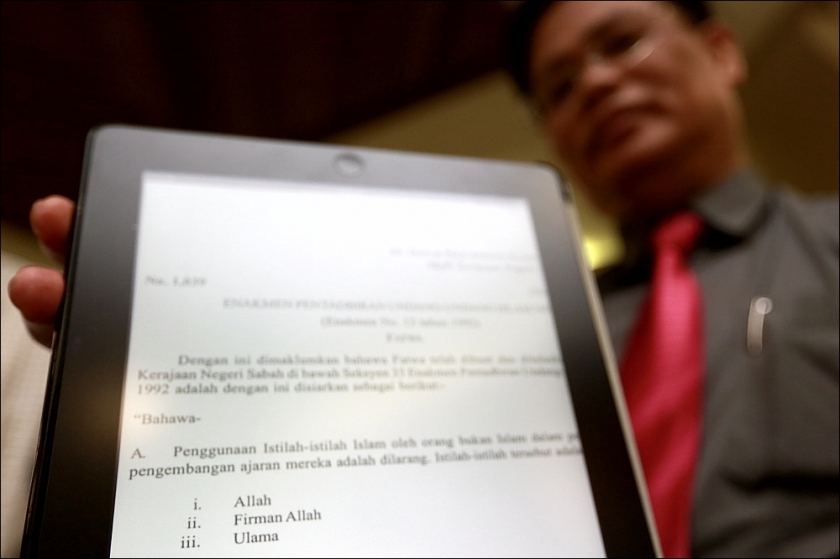Sabah MP wants clarity on ‘Allah’ fatwa in state

PKR MP Darell Leiking claimed that non-Muslims in the state are largely unaware that commonly used Arabic words such as God or ‘Allah’ and ‘Injil’ (Gospel) are included in the list of words may be prohibited to them. Photo: themalaymailonline.com
Feb 2: PKR MP Darell Leiking asked Sabah’s religious authorities today to clarify whether a 2003 religious edict, or fatwa, banning non-Muslims using 31 Arabic remains in effect.
The Penampang MP claimed that non-Muslims in the state are largely unaware that commonly used Arabic words such as God or “Allah” and “Injil” (Gospel) are included in the list of words may be prohibited to them.
“Most Sabahans would think that the prohibition of certain words by non-Muslims is only applicable in the West Malaysia but what they never knew is, there already exist an enactment in the State that prohibits the usage of 31 words by non-Muslims in any forms of publications, printing press, audio-visuals and other modes of communications.
“Unfortunately, the listing had also included certain words which are commonly used by the non-Muslims in the State such as Allah and Injil,” said Leiking in a statement here.
The mufti of Sabah had in June 2003 decreed that non-Muslims are prohibited from using in their religious teachings or propagation 31 Arabic words commonly used by Muslims.
The fatwa was gazetted under Section 35 of the Islamic Laws Administration Enactment 1992.
Besides “Allah” and “Injil”, the list also included “ibadah” (worship), “rasul” (messenger), “iman” (faith), and “wahyu” (revelation).
Leiking highlighted that the fatwa had contravened the Inter-Governmental Committee (IGC) report and the subsequent 20-point agreement drawn up by Sabah (then North Borneo) before the formation of Malaysia.
The 20-point agreement stipulated among others that the people of Sabah are free to practise their own religion, and there should be no state religion in North Borneo.
The Sabah Constitution was, however, amended in 1973 by the state government to make Islam the religion of the state of Sabah.
“While I am very grateful that there is no religious polarisation in the state, and Muslims and non-Muslims co-exist peacefully, my main concern is that the latter would now be at the mercy of the enactment.
“It has the effect that it may now be possible for the religious authority to restrain active propagation of Christianity among non-Muslim Bumiputera in the state,” Leiking warned.
Putrajaya issued the 10-point solution shortly before the Sarawak state election in 2011 to end a Home Ministry blockade of shipments of Christian holy scriptures in the Malay language containing the word “Allah”.
However, Prime Minister Datuk Seri Najib Razak reiterated last month that state enactments on the use of terms deemed exclusive to Muslims override the Cabinet’s more generous 10-point agreement on the matter.
This comes as Selangor religious authorities raided the Bible Society of Malaysia and sized Malay and Iban-language bibles early last month, claiming it was enforcing a 1988 state enactment that prohibits non-Muslims from using 35 Arabic words in their worship, including “Allah”.
Bumiputera Christians, who form about 64 per cent or close to two-thirds of the Christian community in Malaysia, have used the word “Allah” when praying and speaking in the national language and their native tongues for centuries.
source: themalaymailonline.com









